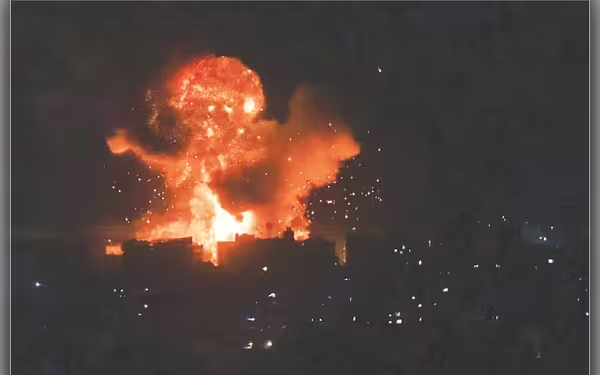Saturday, November 16, 2024 05:35 PM
Israel's Intensified Airstrikes Devastate Beirut Amid Ongoing Conflict
- Israeli airstrikes cause unprecedented destruction in Beirut.
- Over 2,000 casualties reported in Lebanon's escalating conflict.
- UN raises concerns over legality of airstrikes targeting civilians.
 Image Credits: dawn
Image Credits: dawnIsraeli airstrikes on Beirut escalate conflict, causing over 2,000 casualties and raising international legal concerns.
In recent weeks, the conflict between Israel and Hezbollah has escalated dramatically, leading to severe consequences for civilians in Lebanon. The situation reached a critical point during the night of Sunday, when Israeli airstrikes targeted the southern suburbs of Beirut, marking the most intense bombardment since the conflict reignited last month. This surge in violence has left many residents in fear and uncertainty, as the sounds of explosions echoed throughout the capital.
Witnesses reported that the airstrikes created a terrifying atmosphere, with blasts shaking buildings and sending shockwaves across the city. Hanan Abdullah, a resident of Burj al-Barajneh, described the experience, stating, "Last night was the most violence of all the previous nights. Buildings were shaking around us and at first I thought it was an earthquake." The intensity of the attacks was such that it was difficult for residents to keep track of the number of strikes, with many expressing their disbelief at the scale of destruction.
As the sun rose over Beirut, a grey haze enveloped the city, revealing the aftermath of the bombardment. Rubble littered the streets, and columns of smoke rose from the targeted areas. Videos circulating on social media showcased the damage inflicted on infrastructure, including the highway connecting Beirut airport to the city center. Israel has stated that its air force conducted these strikes to target weapons storage facilities and terrorist infrastructure linked to Hezbollah.
The timing of this escalation is significant, coinciding with the anniversary of the October 7 Hamas raid on southern Israel, which triggered a broader military response from Israel across the region, including Gaza and Lebanon. The Lebanese health ministry reported that over 2,000 people have lost their lives in the ongoing conflict, with a significant number of casualties occurring in the past two weeks alone. On Sunday, the ministry confirmed that 23 individuals had died in the previous day's attacks.
International organizations have raised concerns regarding the legality of these airstrikes. The United Nations refugee chief, Filippo Grandi, highlighted that many airstrikes have violated international law by targeting civilian infrastructure and resulting in civilian casualties. He emphasized the humanitarian crisis unfolding in Lebanon, where many civilians are caught in the crossfire, forced to flee their homes while others remain trapped under fire.
As the conflict continues, the plight of refugees becomes increasingly dire. Ivo Friesen, the head of the UNHCR in Lebanon, noted that approximately 6,000 Syrian refugees in the southern region are unable to move due to the ongoing insecurity. They find themselves in a precarious situation, unsure of where to seek safety as the violence escalates.
Israel maintains that its operations are aimed at military targets and that it takes precautions to minimize civilian harm. However, Lebanese authorities argue that civilians are being deliberately targeted. The ongoing conflict has raised questions about the tactics employed by both sides, with accusations of hiding among civilians complicating the situation further.
The recent airstrikes have particularly focused on the Dahiyeh suburb, a known stronghold for Hezbollah, which is home to many ordinary Lebanese citizens, as well as Palestinian and Syrian refugees. The loss of key figures within Hezbollah, such as Sayyed Hassan Nasrallah, has further destabilized the group and its operations.
As the situation in Lebanon remains volatile, the international community watches closely, hoping for a resolution that prioritizes the safety and well-being of civilians. The ongoing conflict serves as a stark reminder of the human cost of war, and the urgent need for dialogue and peace in the region. The resilience of the Lebanese people in the face of such adversity is commendable, yet the path to stability remains fraught with challenges.













